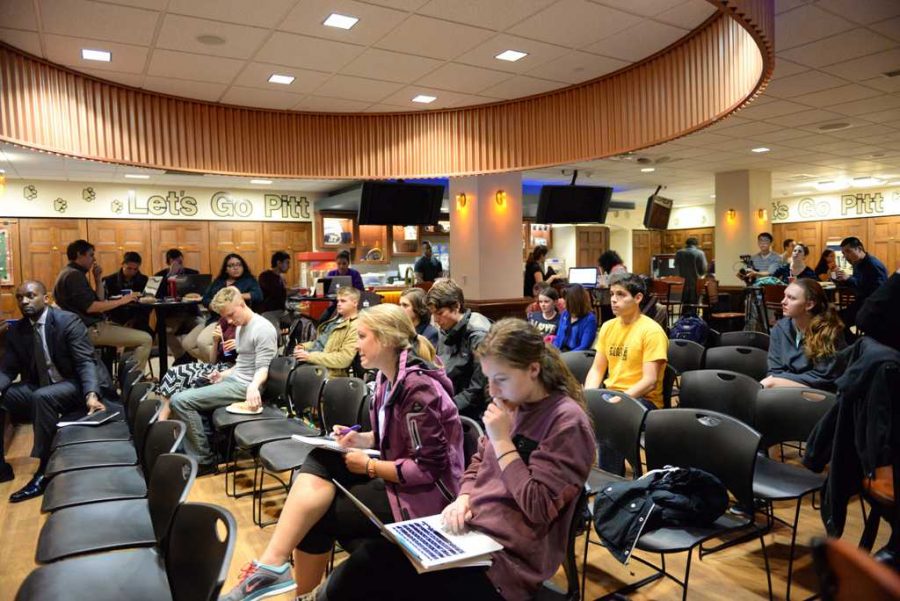After months of back and forth, Student Government Board and University administration offered a tangible — yet controversial — solution to including students in Pitt’s Strategic Plan.
Following SGB’s weekly meeting Tuesday night, SGB and the Strategic Planning Team co-hosted a third open forum. Thirty students — a majority of whom were SGB members — gathered in Nordy’s Place for what Kenyon Bonner, vice provost and interim dean of students, said is the last open forum he has scheduled to address Pitt’s Strategic Plan.
At the first open forum in October, students said they wanted administration to explicitly tell them how the plan would address issues, such as student debt, diversity and sustainability. Bonner said he will compile student concerns from all three forums into a document and will send it to the working groups, planning team and University departments.
“We are never going to say, ‘Here is the final plan.’ We are never going to etch it in stone,” David DeJong, vice provost for academic planning and resources management, said after the first forum. “We want [the plan] to [change] in response to the input we receive and the landscape as it changes.”
Three open forums and two private forums later, students have successfully gained access to the working groups of the strategic plan. SGB, which co-hosted the forum, will screen applications to select two students to sit on each of the five working groups for the Strategic Plan — SGB’s process that some students say is too bureaucratic.
“We’re going to get student representatives into the working groups,” DeJong said Tuesday night. “We heard you at the last forum.”
According to SGB President Nasreen Harun, there will be one or two students in each working group, and the students will serve on the group for the 2015-16 academic year. The application, which SGB posted on its website Tuesday morning, is open to all students, but SGB is looking for students with well-rounded experience.
Applicants will pick their top three choices of working groups, and the Assembly, the lower legislative branch of SGB, will take students’ preferences into consideration when selecting applicants. The Assembly will review the applications at its next meeting on Monday.
“The idea is that these people have had experiences on Pitt’s campus that will allow them to represent the entire student body,” she said. “We’re trying to make sure they are people who carry ideas for the whole student body and are able to take in multiple points of view, and they are not coming in with a personal agenda.”
Sophomore Joseph Dryer has attended both the private student forum that the Student Solidarity Coalition held last week and the first open forum for students and administration. Dryer said while it’s encouraging the University is taking steps to include student input, he’s “wary” of the strategy.
“[SGB might choose] students that aren’t likely to question [the plan] much or might see it as a resumé builder rather than a tool for addressing problems,” Dryer, a communication major, said.
Harun said it’s vital that the SGB Assembly, which includes the Black Action Society, the Resident Student Association, the Rainbow Alliance and the Panhellenic Association, will be choosing the candidates.
“Those are groups that encompass a large portion of the student body,” Harun said. “Having them choose who serves on the working groups is important because they’re selecting someone who can represent all of them.”
Raghav Sharma, the president of Students for Justice in Palestine, has been a prominent student voice throughout the engagement process of the plan.
“If we’re being completely frank, I’ve yet to see any progress being made,” Sharma, a junior politics, philosophy and economics major, said.
The previous forums focused on four of the plan’s strategic goals, while last night’s forum centered on one specific goal in the plan: strengthening communities.
DeJong instructed students to form groups of five to six people and asked each group to discuss a strategy relating to strengthening the Pitt community and the global community at Pitt. These strategies included “strengthening lifelong alumni connections,” “enriching the student experience” and “helping to attract and retain a diverse population.”
Sarah Thornton, a junior studio arts major, wanted to see students interacting with alumni without having to pay to be part of the Student Alumni Association, which provides many opportunities for connecting with a broader community.
“We don’t want to pay to know who the alumni are,” Thornton said. “‘Once a Panther, always a Panther.’ Not ‘Pay to be a Panther.’”
Students also wanted to see the University strengthening communities by including more diversity in the classrooms and on campus. Resident Student Association president Ian Snyder said students should want to come to Pitt for its diversity.
“We don’t want diversity to increase just to say we have diversity. There should be a reason why,” Snyder said.
Dryer said diversity within the University should translate to diversity within the working groups as well. While he doesn’t have an alternative solution, he’s worried the application process “might choose the elite of the school.”
Harun said she understands these concerns, but that the purpose of the application process, which is open to everyone, is to find someone who understands what Pitt has already done and can focus on moving forward.
“We just want to see that the students who applied have a diverse Pitt experience,” Harun said. “I think it’s important that people know where the University is going.”
Regardless of whether or not they’re serving in a working group, Sharma wants to see students engaging in political action outside of SGB or the administration.
“[The application process] promotes the notion that it’s only by working within the confines of what the administration creates that we can create change.”



